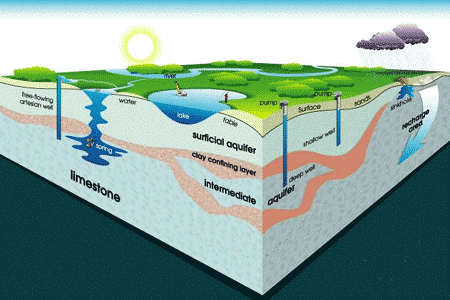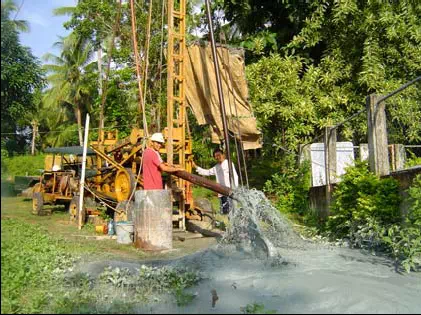Overview
Relevant Activities
Role of Local Governments
U.S. EPA Resources
Other Resources
Other Federal Agencies & Programs
Associations for Local Officials
Funding & Financing
Groundwater is a valuable environmental resource. It replenishes streams, rivers, and habitats and provides fresh water for irrigation, industry, and communities. For many Americans, groundwater is also the primary source of drinking water. However, groundwater is highly susceptible to contamination from septic tanks, agricultural runoff, highway de-icing, landfills, and pipe leaks. EPA protects groundwater supply from pollutants in several ways. The Agency sets and enforces water standards; offers guidance to private well users; regulates the storage, transportation, treatment, and disposal of solid and hazardous wastes, which may infiltrate groundwater systems; and offers resources and expertise to facilitate the rehabilitation of contaminated groundwater sources.
The Ground Water Rule (GWR), published by EPA in the Federal Register on November 08, 2006, provides for increased protection against microbial pathogens in public water systems that use groundwater sources. EPA is particularly concerned about groundwater systems that are susceptible to fecal contamination, which may contain disease-causing pathogens.
GWR applies to public water systems that serve groundwater. The rule also applies to any system that mixes surface and ground water if the ground water is added directly to the distribution system and provided to consumers without treatment.
U.S. Environmental Protection Agency Resources
- Ground Water and Drinking Water. The Office of Ground Water and Drinking Water, along with EPA's ten regional drinking water programs, oversees implementation of the Safe Drinking Water Act.
- Ground Water Rule (GWR). EPA website that provides quick reference guides to the rule (which provides for increased protection against microbial pathogens in public water systems that use groundwater sources) and compliance monitoring under the rule.
- Underground Injection Control Program. EPA website for the UIC Program, which is responsible for regulating the construction, operation, permitting, and closure of injection wells that place fluids underground for storage or disposal.
- Hydroweb. EPA groundwater modeling software.
- Key EPA groundwater guidance and selected other reports. Reports on groundwater frequently used by Superfund remedial project managers.

Other Federal Agencies & Programs
-
USGS Groundwater Basics. The U.S. Geological Survey provides unbiased, timely, and relevant information and studies about groundwater resources.
Associations for Local Officials
- American Water Works Association. Founded in 1881, AWWA provides information and advocacy to improve the quality and supply of water in North America and beyond.
- Association of Metropolitan Water Agencies. AMWA is an organization of the largest publicly owned drinking water systems in the United States.
Under the Drinking Water State Revolving Fund, EPA awards grants to states to establish revolving loan funds to assist public water systems with infrastructure improvements. The program also allows states to reserve a portion of their grant to fund activities needed for source water protection and enhanced water systems management.
For more information on funding and financing programs and options for groundwater, please see the Groundwater section of LGEAN's Funding & Financing page.


